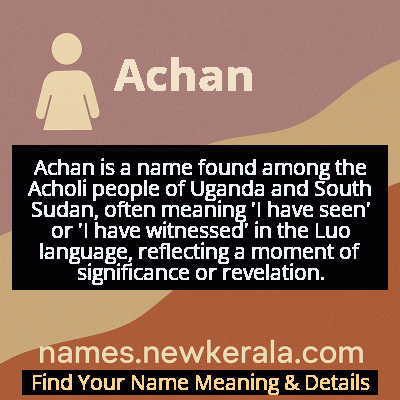Achan Name Meaning & Details
Origin, Popularity, Numerology Analysis & Name Meaning of Achan
Discover the origin, meaning, and cultural significance of the name ACHAN. Delve into its historical roots and explore the lasting impact it has had on communities and traditions.
Name
Achan
Gender
Female
Origin
African
Lucky Number
9
Meaning of the Name - Achan
Achan is a name found among the Acholi people of Uganda and South Sudan, often meaning 'I have seen' or 'I have witnessed' in the Luo language, reflecting a moment of significance or revelation.
Achan - Complete Numerology Analysis
Your Numerology Number
Based on Pythagorean Numerology System
Ruling Planet
Mars
Positive Nature
Generous, passionate, energetic, and humanitarian.
Negative Traits
Impulsive, impatient, moody, and can be overly emotional.
Lucky Colours
Red, maroon, scarlet.
Lucky Days
Tuesday.
Lucky Stones
Red coral, garnet.
Harmony Numbers
1, 2, 3, 6.
Best Suited Professions
Military, sports, philanthropy, leadership roles.
What People Like About You
Courage, energy, leadership, generosity.
Famous People Named Achan
Achan Malou
Community Leader
Founded women's empowerment initiatives in South Sudan focusing on education and economic development for twin mothers
Achan Deng
Healthcare Advocate
Pioneered maternal health programs specifically addressing the unique needs of twin pregnancies in rural South Sudan
Achan Biong
Cultural Preservationist
Documented and preserved Dinka twin naming traditions through oral history projects and cultural exhibitions
Name Variations & International Equivalents
Click on blue names to explore their detailed meanings. Gray names with will be available soon.
Cultural & Historical Significance
The name Achan embodies the cultural reverence for twins, who are believed to bring double blessings and are often associated with spiritual significance in Dinka cosmology. Historically, twins in Dinka society were thought to possess special connections to the spiritual world, and their births were celebrated with particular ceremonies and rituals that acknowledged their unique status within the community. The preservation of this naming tradition through periods of conflict and displacement demonstrates its deep cultural importance and serves as a testament to Dinka resilience and commitment to maintaining their cultural identity.
Extended Personality Analysis
Women named Achan are often perceived as natural leaders with strong protective instincts, reflecting their birth position as the first twin. They typically exhibit qualities of responsibility, reliability, and nurturing behavior, having been culturally conditioned from birth to look after their twin sibling. Many Achan-named individuals demonstrate exceptional organizational skills and a pragmatic approach to problem-solving, traits that serve them well in their traditional role as the 'older sister' who must set examples and provide guidance.
Their personality often blends traditional values with adaptive thinking, making them effective bridges between generations and cultures. The experience of being a twin from birth tends to foster deep empathy, strong interpersonal skills, and an innate understanding of partnership and cooperation. These women frequently display remarkable resilience and emotional intelligence, having navigated the unique dynamics of twin relationships while often serving as cultural ambassadors for their distinctive naming tradition. The combination of leadership qualities and collaborative spirit makes Achan-named individuals particularly effective in community-building roles and cultural preservation efforts.
Modern Usage & Popularity
In contemporary times, the name Achan maintains its cultural significance within South Sudanese communities while gaining recognition in diaspora populations. The name continues to be used traditionally for first-born female twins among Dinka families, preserving an important cultural practice that survived through decades of conflict and displacement. With the establishment of South Sudan as an independent nation in 2011, there has been a resurgence of interest in traditional naming practices, with Achan experiencing renewed popularity as a symbol of cultural pride and identity. In diaspora communities across Australia, the United States, and Canada, the name serves as an important cultural marker, helping maintain connections to Dinka heritage. Social media platforms and digital communities have enabled Achan-named individuals to connect and share experiences, creating new networks that celebrate this unique naming tradition while adapting to global contexts. The name's usage reflects both cultural preservation and modern adaptation, making it a living tradition rather than a historical relic.
Symbolic & Spiritual Meanings
Achan symbolizes the concept of 'firstness' and pioneering spirit within the Dinka cultural framework. Metaphorically, the name represents leadership, protection, and the responsibility that comes with being the first to arrive or lead the way. In broader symbolic terms, Achan embodies the duality of twinhood – representing both individuality and inseparable connection, independence and interdependence. The name carries connotations of blessing and special favor, as twins in Dinka tradition are considered particularly blessed. Symbolically, Achan also represents cultural continuity and the preservation of tradition in the face of modernization and globalization. The name serves as a living connection to ancestral practices while adapting to contemporary realities, making it a powerful symbol of cultural resilience and identity preservation for the Dinka people and South Sudanese communities worldwide. This symbolic richness transforms the name from merely a personal identifier into a vessel carrying centuries of cultural wisdom and spiritual understanding.

